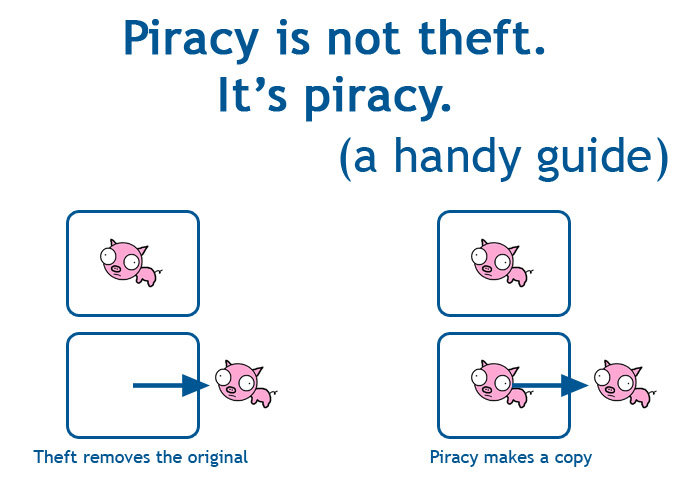^^Good points, though I would think that when it comes to entertainment media (which is the crux of the Great Piracy Debate), the physical effort in producing the media may deserve some compensation, even if the intangible ideas themselves don't.
So perhaps piracy is irrelevant when it comes to the idea of a movie, for instance, but may be relevant insofar as the cost of producing that movie are involved (filming, casting, SFX, distribution, etc.). The same might be said for music, for television, for books, and for games, concerning the cost of production, and not the compensation for the intellectual output.
In such a case, it would seem to fall into your distinction between piracy and theft. To "pirate" a movie, for instance, would not be an act of "piracy" (lack of compensation for the idea of the movie's narrative), but an act of theft (lack of compensation for the physical labour cost in the production and distribution of the movie proper).
Would you say that this an accurate embodiment of your above deliberations, @
 Xivii
Xivii
?
I would argue that when it comes to digital content/content that can potentially be digitized, it is impractical to enforce compensation rights. As SilentBob pointed out, to pirate digital content is to copy, not to steal. DC contains properties that are closer to ideas themselves than to tangible creations.
If you steal a farmer's crops, he is actually losing something. If you copy an artist's song, he does not lose anything tangible. The counter to this would be that when paying for DC, one isn't paying for a product, but rather for a service--as you said, the physical effort. There is a civil contract that is assumed between service providers and customers. One is expected to pay their barber for the haircut they received or their doctor for their treatment. While not paying for the service received isn't technically stealing a physical object from a service provider, one is still exhausting physical labor and depleting physical resources.
There's no doubt that people should be paid for their services, but who dictates the means, source, and amount of payment has always been an issue. Even so, it is fairly practical to enforce payment standards when dealing with non-digital services. Most of the time, the expenses incurred for providing a service to an individual can be accurately calculated. Even situations where there are no legal obligations for a customer to pay for a service (such as tipping a waiter) can be reasonably fixed (including tip in the bill).
DC differs from non-digital services in one basic way: lack of scarcity. Unlike a haircut from a barber or surgery by a surgeon, an artist need only produce their work once to reach an infinite amount of consumers. Once a work is produced, a practically infinite number of copies can be made and be viewed or listened to practically anywhere by anyone. There is no scarcity involved. The laws of supply and demand do not apply to DC. No matter how great the demand, the supply will never deplete.
Enforcing compensation for an artist's labor by everyone who uses their creation is simply not practical. As for whether or not an artist
deserves compensation? I would also say no. Don't get me wrong, I feel that people
should pay for works of art and entertainment that they value if they can, but I do not feel that they should
have to. I do not feel that one would be in the wrong for not doing so, and I do not feel that an artist necessarily deserves payment for a creation. As I said, if an artist fails to profit from their venture, that is their burden. If it is not a feasible means of profit, then that is that. It may be a harsh reality, but it is reality. There is no moral code that states that an artist has the right to make money off of their work.
That being said, I do not believe that even without copyright law, people would fail to support artists. The evidence shows
otherwise. There is a great abundance of media today, and studies show that people are willing to pay for things they value if they have the means of doing so. While it is true that people do not pay for all the media they consume, they pay for more media in general than they did before the mainstream internet. In fact, studies have shown that people who
pirate media tend to
pay for more media than those
who do not pirate. This is likely because pirates tend to be larger media consumers overall; so even though they do not pay for all of their content, they spend more on media in general.


